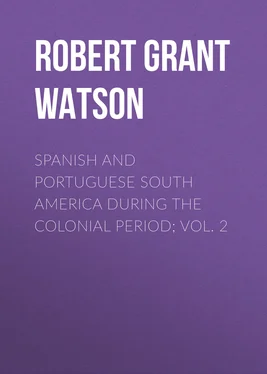Robert Grant Watson - Spanish and Portuguese South America during the Colonial Period; Vol. 2
Здесь есть возможность читать онлайн «Robert Grant Watson - Spanish and Portuguese South America during the Colonial Period; Vol. 2» — ознакомительный отрывок электронной книги совершенно бесплатно, а после прочтения отрывка купить полную версию. В некоторых случаях можно слушать аудио, скачать через торрент в формате fb2 и присутствует краткое содержание. Жанр: foreign_prose, История, foreign_edu, foreign_antique, на английском языке. Описание произведения, (предисловие) а так же отзывы посетителей доступны на портале библиотеки ЛибКат.
- Название:Spanish and Portuguese South America during the Colonial Period; Vol. 2
- Автор:
- Жанр:
- Год:неизвестен
- ISBN:нет данных
- Рейтинг книги:3 / 5. Голосов: 1
-
Избранное:Добавить в избранное
- Отзывы:
-
Ваша оценка:
- 60
- 1
- 2
- 3
- 4
- 5
Spanish and Portuguese South America during the Colonial Period; Vol. 2: краткое содержание, описание и аннотация
Предлагаем к чтению аннотацию, описание, краткое содержание или предисловие (зависит от того, что написал сам автор книги «Spanish and Portuguese South America during the Colonial Period; Vol. 2»). Если вы не нашли необходимую информацию о книге — напишите в комментариях, мы постараемся отыскать её.
Spanish and Portuguese South America during the Colonial Period; Vol. 2 — читать онлайн ознакомительный отрывок
Ниже представлен текст книги, разбитый по страницам. Система сохранения места последней прочитанной страницы, позволяет с удобством читать онлайн бесплатно книгу «Spanish and Portuguese South America during the Colonial Period; Vol. 2», без необходимости каждый раз заново искать на чём Вы остановились. Поставьте закладку, и сможете в любой момент перейти на страницу, на которой закончили чтение.
Интервал:
Закладка:
1646.
The Dutch now became so greatly distressed for provisions that the Indians were only kept in their service by the opinion which was propagated, that every deserter to the enemy met with torture and death. The besiegers, too, began to suffer from want of provisions; but the form which discontent took in this case was desertion to Bahia , and severe measures had to be adopted by the Governor-General to put a stop to this practice. The Dutch, having made an attempt in force to intercept a convoy of cattle from Paraïba , were defeated with considerable loss at S. Lourenço .
Shortly after the above-mentioned event, there arrived at the camp two Jesuits, sent by the Governor-General, and who were the bearers of an astounding mandate from the King of Portugal, to the effect that his generals, Vidal and Martim Soares, should retire forthwith to Bahia , leaving Pernambuco in the possession of the Dutch. The reason of this order will presently be explained. In the meantime it is to be shown in what manner it was received. The two generals, or camp-masters as they were called, were at first so taken aback that they knew not how to reply. To yield up the country which they had won step by step with such difficulty, and to leave in possession a heretical enemy whom they detested, was naturally abhorrent to their feelings as soldiers, as patriots, and as Catholics. On Joam Fernandes, who had risked all on the insurrection, the blow fell yet more heavily. He was, however, the first to rally; when he declared that the King’s orders, having been issued in ignorance of the actual situation, ought not to be obeyed without a further reference to his Majesty.
This opinion prevailed, and was accordingly referred to the Governor-General at Bahia . He, however, having received positive orders, declined to take any responsibility upon himself should they be disobeyed. Upon this Martim Soares gave up his command, and sailed soon afterwards for Lisbon. Vidal and Joam Fernandes, however, remained true to their first resolution.
The orders from Lisbon had not been issued without great reluctance. The Duke of Braganza did not feel secure of his throne, and was apprehensive lest Holland should ally herself with Spain against him. He was at this time represented at The Hague by Francisco de Sousa Coutinho, an ambassador of great ability, which was in no small degree essential to his country, seeing the difficult part he had to play. De Sousa saw from the first that the West India Company were not equal to carrying on the expensive war in which they were embarked; and he accordingly advised his master to give the insurgents effective though unavowed assistance. When it became evident in Holland that the Portuguese authorities of Bahia put forth no effort to suppress the insurrection, the States retaliated by giving orders to seize all vessels coming from Pernambuco , a measure which was made a pretext for seizing Portuguese shipping in general. In short, Holland and Portugal were gradually drifting into open war; and, as has been said, the fear of an alliance being formed between the States and Spain had weighed with the King to send orders for the evacuation of Pernambuco .
It will be remembered that at the commencement of the insurrection there were many murmurs and menaces directed against Joam Fernandes; it had been even necessary to take special precautions against his being assassinated. In face of his brilliant successes, all murmurs against him had been silenced, and he was rightly regarded as the hero of a successful revolution for the liberation of his province. Now, however, that he was known to be acting in contravention of the express orders of his sovereign, the clamour against him recommenced. He was repeatedly warned that his life was in danger, and he received the names of nineteen persons who were engaged in a conspiracy against him. These communications producing no effect, the writer called upon Fernandes, and remonstrated with him; but he had the mortification of finding himself looked upon as a calumniator. With Vidal, however, he had more success; in so far that his story was at least believed, and an attempt was made to bring the conspirators to reason.
Not long afterwards, however, Fernandes, in coming from one of his sugar-works, having outridden his bodyguard, was attacked by three Mamelucos , one of whom shot him through the shoulder. One of the assassins was cut to pieces by his guard; the other two escaped through the canes. Fernandes, although he was aware of the conspirator who had set on the assassins, was magnanimous enough not to denounce him.
After this escape, Fernandes and Vidal organized a daring expedition against the island of Itamaraca . It was not successful in winning Fort Orange ; but the rest of the island fell into the hands of the Portuguese, the Dutch having previously expelled from it their Indian allies.
The distress in Recife now reached the length of famine. The city was searched for food, and all that could be found was put into a common stock, one pound of bread per week being allowed for each soldier and citizen. But even this scanty allowance had soon to be withheld from the townspeople, in order that that of the soldiers might be doubled; for the latter now began to listen to the suggestions of the enemy. Horses, dogs, cats, and rats were greedily devoured; and many slaves died of inanition. Neither courage nor ingenuity could avail to procure food; whilst to venture beyond the works was certain death at the hands of Diaz and his negroes.
Months had elapsed since the dangerous position of the city had been known in Holland, but still no reinforcements arrived. Things had now come to such a pass that a capitulation or a complete surrender could no longer be delayed; for there was but food left for two days more. It is strange that at this critical moment the stoutest defenders of Recife should have been the Jews. Were the place rendered up to the Portuguese, they could hope to avoid death by apostasy alone; they had resolved, therefore, to perish by the sword rather than to surrender, and they had even induced the Council seriously to consider a plan for a general sally of the whole besieged population. Such was the result of the intolerant bigotry of the Portuguese.
At this supreme moment what were the feelings of the starving crowd when they beheld two vessels bearing towards the port under full sail, and carrying the Dutch colours? Casting anchor, they saluted with three guns, thus denoting that they were from Holland. They were the advanced guard of a convoy which might hourly be expected. It is here necessary to state the circumstances under which this fleet sailed, and also those which led to its tardy arrival.
It has been mentioned above that the interests of Portugal were at this time watched over at the Hague by a most astute diplomatist. The professional morality of European diplomacy has become considerably stricter in the course of late years than it was in the year of which we write, namely, 1646. Francisco de Sousa must be judged, therefore, as to his diplomatic conduct, by the ethics of his own age rather than by those of the present time. He had a most difficult part to play; and, being a thorough patriot as well as doubtless a devout Catholic, he held that the interests of his country, if not those of his faith, justified him in any amount of dissimulation, in order to secure them. His judgment both as to the importance of the Portuguese settlements in Northern Brazil to his country and as to the practicability of recovering them, was sound, as was proved by the event; but, as has been said, there were imperious reasons to make the court of Lisbon dread an open rupture with Holland. Under the circumstances the ambassador had the courage to take upon himself the entire responsibility of negotiating with the Dutch, leaving it to his master to disavow his proceedings should it prove necessary for the public well-being so to do. He was well aware that he was fully trusted; but he could not foresee all the possibilities of the future.
Читать дальшеИнтервал:
Закладка:
Похожие книги на «Spanish and Portuguese South America during the Colonial Period; Vol. 2»
Представляем Вашему вниманию похожие книги на «Spanish and Portuguese South America during the Colonial Period; Vol. 2» списком для выбора. Мы отобрали схожую по названию и смыслу литературу в надежде предоставить читателям больше вариантов отыскать новые, интересные, ещё непрочитанные произведения.
Обсуждение, отзывы о книге «Spanish and Portuguese South America during the Colonial Period; Vol. 2» и просто собственные мнения читателей. Оставьте ваши комментарии, напишите, что Вы думаете о произведении, его смысле или главных героях. Укажите что конкретно понравилось, а что нет, и почему Вы так считаете.












